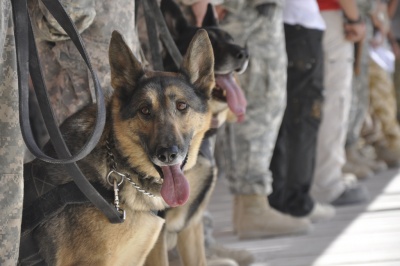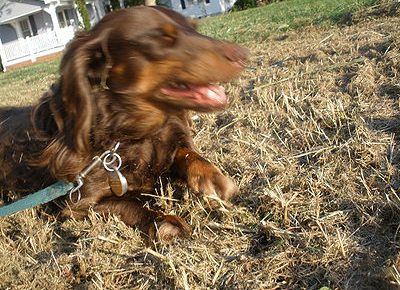
Military dogs go through a rigorous training period and play an undisputed role helping the armed forces in many ways. Unfortunately not only do our soldiers suffer post traumatic stress disorders, but combat can do the same to our 4-legged friends.
Still a fairly new concept, it’s estimated that more than 5% of military dogs suffer from some form of PTSD, Post Traumatic Stress Syndrome. Veterinarians have diagnosed PTSD in dogs exposed to combat violence, the jarring noises of explosives and gunfire in Iraq and Afghanistan. Changes in behavior have been noted, some dogs will not do their jobs, some become aggressive with their handlers, some become fearful and timid.
Military breeds, mainly German Shepherds along with Belgian Malinois and Labrador Retrievers, numbering about 2,700 presently in the service, were once used as sentries. They have since been trained to perform many tasks such as searching out IEDs (improvised explosive devices), as well as buildings and enemy fighters. More than 50 military dogs have been killed in the line of duty since 2005.
The training school for military dogs is located at Lackland Air Force Base in Texas. Dr. Walter F. Burghardt Jr. is chief of behavioral medicine at Lackland’s Daniel E. Holland Military Working Dog Hospital. While Dr. Burghardt, a retired Air Force Colonel, rarely sees the dogs, he trains other veterinarians to spot PTSD through a series of videos and phone consultations.
Since dogs cannot tell us what they are feeling, vets are trained to read signs of PTSD. Some dogs can get back on track with off duty time, exercise, play and gentle obedience training reminders. Dr. Burghardt recommends what he calls “desenitization counterconditioning” for more serious cases. The dog is exposed to sights and sounds from a safe distance, that can prompt a reaction. If the dog does not react, it is rewarded and the trigger is gradually moved closer. Some dogs require long-term treatment. If they don’t respond to treatment after 3 months, they are retired or assigned other duties.
Some dogs are being treated with anti-anxiety medications such as Xanax which appears to help.
PTSD is also recognized in household pets who have experienced traumatic events. Dr. Nicholas H. Dodman, director of the animal behavior clinic at the Cummings School of Veterinary Medicine at Tufts University, has treated stressed and anxious dogs for years and believes that PTSD can be managed but not cured as dogs never forget.



